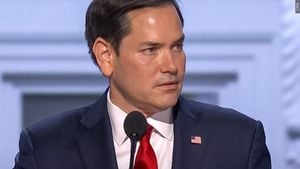On his first day as the 47th President of the United States, Donald Trump initiated what many are calling a radical shift in federal policy with a sweeping series of executive orders. His actions not only reaffirmed key campaign promises made during the 2024 election but also set the tone for his administration's priorities, which heavily center around immigration control, economic rejuvenation, and social conservatism.
One of the most controversial decisions made on this momentous day was Trump's issuance of pardons to nearly 1,500 individuals associated with the January 6 Capitol riot. By offering clemency to these participants, Trump sent a clear message of loyalty to his supporters. "We hope they come out tonight, frankly," he stated, as he referred to the pardons. This action has drawn criticism from various quarters, with opponents viewing it as undermining the rule of law.
On the immigration front, Trump signed executive orders declaring illegal immigration at the U.S.-Mexico border to be a national emergency. "All illegal entry will immediately be halted and we will begin the process of returning millions and millions of criminal aliens back to the places from which they came," he proclaimed, demonstrating his commitment to strict immigration policies. These orders aim to dismantle existing asylum programs and weaken protections offered to undocumented immigrants.
His immigration strategy includes the controversial proposal of ending birthright citizenship, leading to potential legal battles against the guarantees established by the 14th Amendment. This move has left many activists and legal experts questioning its constitutionality and feasibility.
Trump's economic focus revolved around boosting domestic energy production. He announced his decision to withdraw the U.S. from the Paris Climate Agreement, which he labeling as "unfair" and detrimental to the American economy. By signing this order, Trump reaffirmed his commitment to fossil fuel initiatives, igniting hopes among supporters eager to see the revitalization of the oil and gas industry. "I am immediately withdrawing from the unfair, one-sided Paris Climate Accord rip off," he asserted at the Capital One Arena, signaling his administration's intention to roll back environmental protections once again.
Social policy under Trump is also shifting dramatically. He issued orders targeting diversity, equity, and inclusion programs across federal agencies, aiming to eliminate approaches perceived as politically correct or as "social engineering." His administration will now officially recognize only two genders—male and female—stopping federal acknowledgment of non-binary and transgender identities. "We will forge a society that's color-blind and merit-based," Trump emphasized during his inaugural address.
The reactions have been swift and polarized. Activists and human rights advocates have vowed to challenge these executive orders, viewing them as regressive attacks on hard-won civil rights. Kelley Robinson, president of the Human Rights Campaign, expressed determination, stating, "We refuse to back down or be intimidated. We are not going anywhere, and we will fight back against these harmful provisions with everything we've got." Similarly, Tanya Neslusan from MassEquality remarked, "What does it really mean to have an ‘official policy’ recognizing only two genders? There are specific steps needed beyond merely saying this is our stance.”
Trump's first-day actions also included regulatory freezes and hiring freezes across federal agencies, aiming to reduce what he refers to as the "deep state." This brings back memories of his initial term where similar tactics were employed. Critics argue such measures could lead to chaos within the federal sector, impeding necessary services and regulations. “Such blanket freezes exacerbate workforce shortages and contribute to skills gaps,” warned Everett Kelley, president of the American Federation of Government Employees.
Notably, Trump highlighted his desire for the return of federal employees to the office, marking another shift away from pandemic-era work-from-home arrangements. His remarks indicate how his administration intends to reshape the federal workforce by emphasizing loyalty and direct accountability.
While the partisan divide deepens, the long-term effects of Trump's combative governance approach remain to be seen. Will his orders successfully reshape the nation’s policies? Or will they face determined opposition both in the courts and public opinion? Legal experts predict significant challenges to many of these initiatives; as constitutional boundaries are tested, it could lead to prolonged disputes over the new administration's authority.
Trump's actions on this first day certainly set the tone for another tumultuous presidency, with both supporters and detractors alike watching closely as he seeks to affirm his brand of governance within the American political sphere. Moving forward, the upcoming weeks and months of policies and actions will be closely examined as the nation grapples with the promised changes under Trump's leadership.



